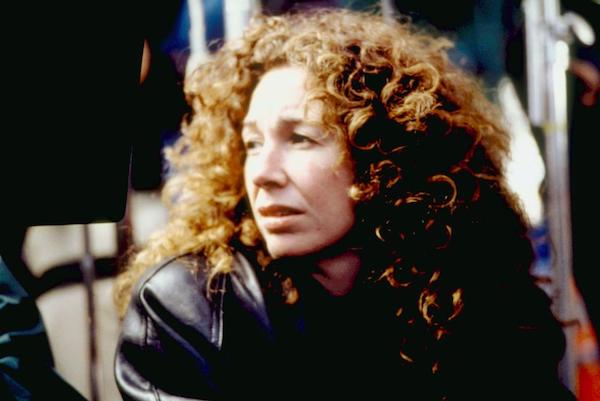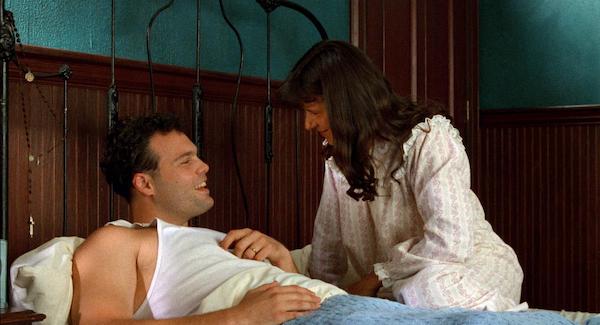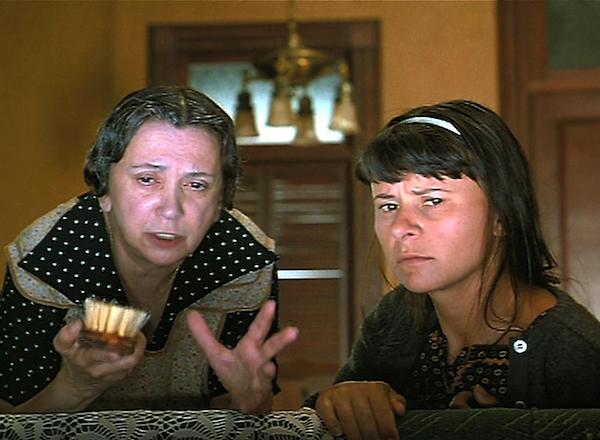Film Interview: Director Nancy Savoca on “Household Saints”
By Betsy Sherman
In the spirit of revisiting this unsung indie classic, here’s an interview the critic did with director Nancy Savoca in 1993, when Household Saints was part of the Boston Film Festival.
Household Saints (1993). At the Brattle Theatre, Cambridge, Jan. 5-7. Go to brattlefilm.org for film times and information on in-person guests.

Director Nancy Savoca on the set of 1999’s The 24 Hour Woman. Photo: Artisan Entertainment
It’s been just over 30 years since the third feature by Bronx-born director/writer Nancy Savoca, Household Saints, opened at Cambridge’s Brattle Theatre. A restored version of the film makes a return to the theater on the weekend of Jan. 5-7, with a generous helping of extras and special guests.
Savoca will introduce the film at screenings on Friday and Saturday, along with the producer/co-writer, Richard Guay. The creative partners have been married since 1980 and have three children — including Martina Savoca-Guay, who will be on hand with her documentary The Many Miracles of Household Saints, screening Saturday afternoon. By the way, Savoca was pregnant with Martina while shooting the film, and very pregnant while editing it.
Screening with the documentary are Savoca’s student films Renata (1982) and Bad Timing (1982), each featuring actress Marianne Leone (who played a nun in Household Saints and later the mother of cast mate Michael Imperioli in The Sopranos). The latter short also features Leone’s husband, Chris Cooper, in his onscreen debut. Both will be at the Brattle for the Q&A.
Savoca and Guay’s debut feature was the 1989 True Love (starring Annabella Sciorra and Ron Eldard), followed by the 1991 Dogfight (starring Lili Taylor and River Phoenix). Household Saints centers on three generations of women in the Santangelo family of New York’s Little Italy. The first half of the diptych-structured film details the comic courtship between butcher Joseph Santangelo (Vincent D’Onofrio) and Catherine Falconetti (Tracey Ullman) and the fierce opposition to the union by Joseph’s Old World mother, Carmela (Judith Malina). The darker-toned second half focuses on the couple’s daughter, Teresa (Lili Taylor), who’s obsessed with Catholic ritual and aspires to the purity of her name saint. Her yearning for ascetic self-sacrifice jeopardizes her health and possibly her sanity. Michael Imperioli plays a young man attracted to Teresa.
In the spirit of revisiting this unsung indie classic, here’s an interview I did with Savoca on September 15, 1993, when Household Saints was part of the Boston Film Festival. It has been edited and condensed.
Arts Fuse: When did you first come in contact with Francine Prose’s novel Household Saints?
Nancy Savoca: When it came out in 1981 I was a reader for an independent production company and I just fell in love with it. Francine Prose has such a great way of describing things, it read like a movie. When I got to the end of it, it haunted me for a long time. You realize that all these coincidences and twists and turns in the story, every event had to happen in order for us to get back to the end. You realize, if I hadn’t met that person, if I hadn’t taken this job, if I didn’t lose that job — you’re where you are now because of all these things happening. In this movie, there are like five different levels of what goes on.

Vincent D’Onofrio and Tracy Ullman in a scene from Household Saints. Photo: Fine Line
AF: What did you do in adapting it that was different from the novel?
Savoca: I was so in love with the book and I didn’t want to cut anything out so I just wrote everything that was in the book, plus added some scenes I needed for the film. The book is 265 pages and [the screenplay] was like 267 pages (laughs). Rich [Guay] said no, it was too long, so he started cutting it and shaping it. But writing the whole thing sort of made the story mine and I needed to do that. The stuff we added, in the book little Teresa never has a scene with her Uncle Nicky (Michael Rispoli), and I thought it was important because they’re kindred souls. They’re the only people in the family that aren’t content. I gave [Teresa] a spiritual notebook so that we could have voice over when she’s writing. It fit very nicely, because her idol Saint Thérèse kept a spiritual notebook.
AF: Did you have Lili Taylor in mind when you were writing this?
Savoca: Yeah, because I worked with her in Dogfight, I knew. Here’s a character who could very well be like nothing on screen. A girl who’s got internal struggles going on. What does that look like? Working with Lili, I knew that she was going to pull that off and give people something to look at. The great thing is, she jumped into it with such relish. She gave me a great book called Holy Anorexia, which compares 14th-century woman saints with anorexic young girls today and how there’s so much in common in terms of controlling their lives, the psychology of it. We exchanged books, music, movies, videos, photographs, paintings, anything that related somehow. We talked a lot about Saint Thérèse. Somehow all this homework translated emotionally.
AF: How did Judith Malina approach her role?
Savoca: Oh man, I love Judith Malina. She’s a really wild, wonderful performer. She’s from the Living Theater in New York. Francine knew her and talked about casting her. I knew she was going to do wonderful things with Carmela. She knew more about the character than I did. You think she’s gonna fall into caricature, but she’s doesn’t. The way she is [in the film] is sort of the way she is in real life, except she’s not as close-minded as Carmela, but she’s got that energy of Carmela.

Judith Malina and Tracey Ullman in a scene from Household Saints. Photo: Fine Line
AF: The whole ritual of making sausages, what went into putting that on film?
Savoca: That’s another wonderful thing in the book, and something that I really appreciated, because my father’s a cook and I love to cook. I met Rich through sausage. He used to work in a deli, he delivered sausage. So sausage means a lot to me (laughs). Food is such an emotional thing. Like [Vincent D’Onofrio’s character] Joseph, looking down at the sausage, “I gotta marry this girl, it’s wonderful.” The book dictated that there had to be really tight close-ups so we could get a sense of what that all was like. Of course Judith’s a vegetarian. I found that out on set. She doesn’t touch meat, much less eat it. So when she’s making sausage in the background, we used kidney beans. But when we did the close-ups she had to touch the meat, and she did. She said, (whispers) “Don’t tell anybody I did this.”
AF: What experiences [regarding Catholicism] came from you or Richard, especially since Francine Prose isn’t Catholic?
Savoca: Francine always says I got the book better than she did, because it’s more my life. Rich did eight years of Catholic school, which cured him of anything spiritual (laughs). For me, my mother’s Argentinian and very religious. I grew up in that atmosphere. I accepted everything that Catholicism had. The negative stuff binds you and makes you not think about anything else, but then there’s what I see as the positive stuff, which is this acceptance of magic, of mysticism. When I was about 13, I started reading about the historical Christ and I got upset that I’d been lied to. I threw the baby out with the bathwater and said, like Catherine [in the film], get this stuff away from me. And when I read the book, it came back up. Just like Catherine’s comes back up. That’s when I thought, working on a movie like this is a great excuse to ask all these questions. And that’s what the spirit was, all of us going in trying to learn stuff. Which I think is the best way of making a movie.
Betsy Sherman has written about movies, old and new, for the Boston Globe, Boston Phoenix, and Improper Bostonian, among others. She holds a degree in archives management from Simmons Graduate School of Library and Information Science. When she grows up, she wants to be Barbara Stanwyck.
Tagged: Francine Prose, Household Saints, Judith Malina, Lili Taylor, Nancy Savoca
